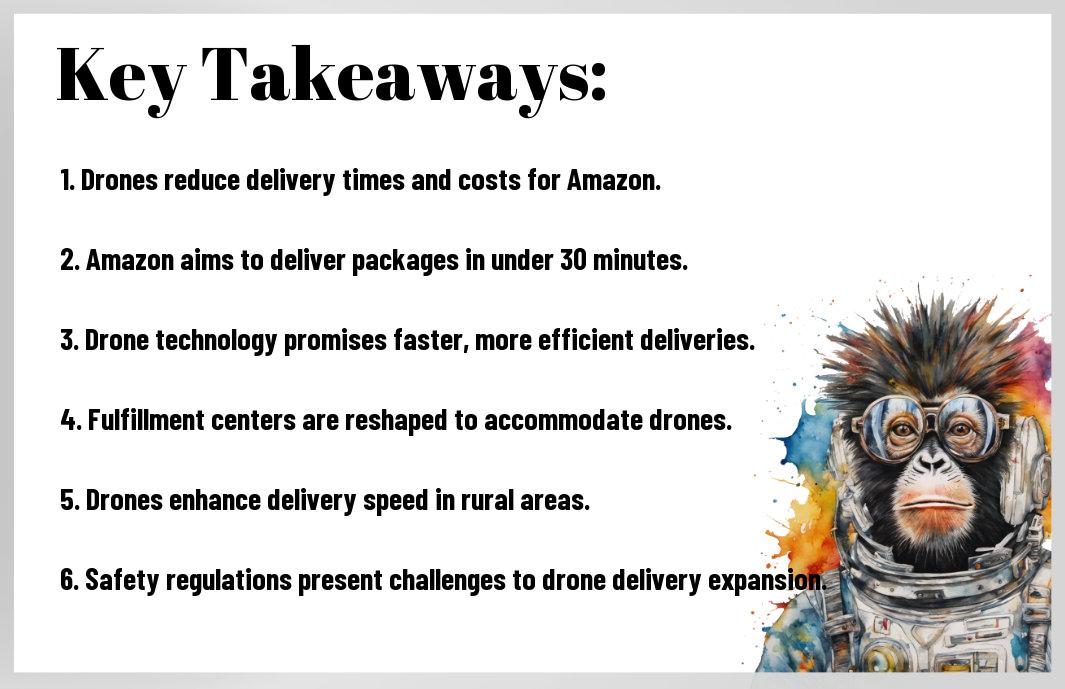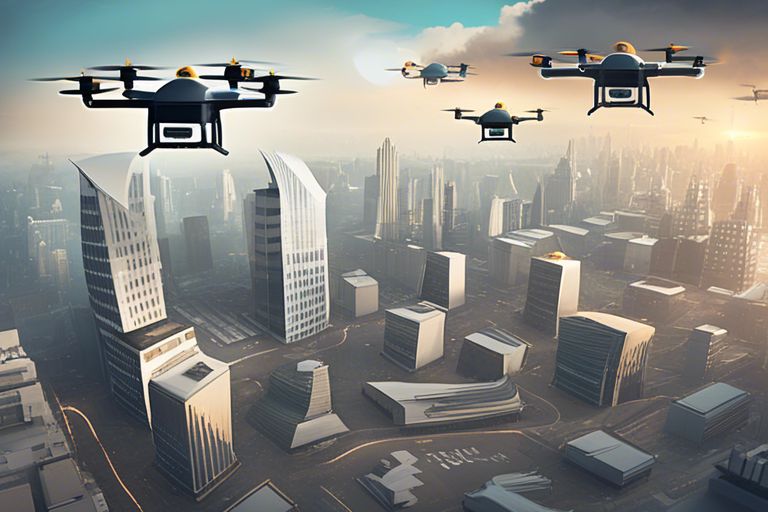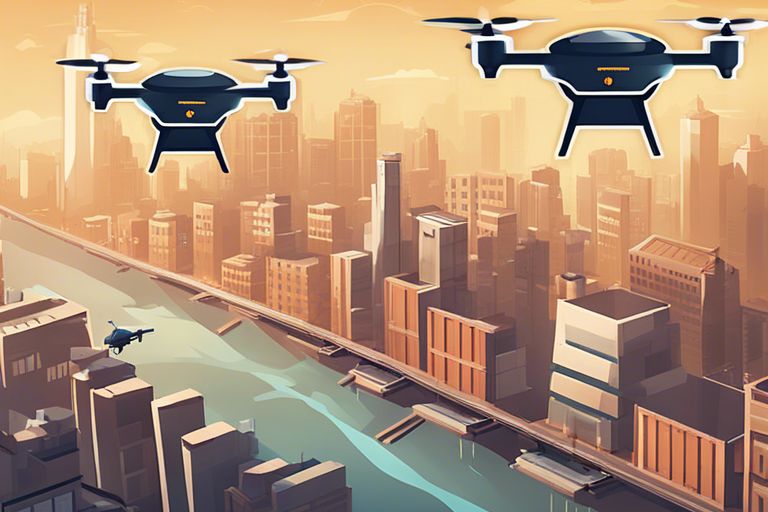Drones have revolutionized the way companies approach logistics, and Amazon is at the forefront of this technological advancement. With the implementation of drone deliveries, Amazon has drastically improved the efficiency and speed of their fulfillment process. These unmanned aerial vehicles have drastically reduced delivery times and lowered operational costs for the e-commerce giant. However, this innovation comes with its own set of challenges, from regulatory hurdles to safety concerns. In this blog post, we will investigate into how drone deliveries are reshaping Amazon’s logistics and what the future holds for this game-changing technology.
Key Takeaways:
- Efficiency: Drone deliveries are streamlining Amazon’s logistics operations, enabling faster and more efficient delivery of packages to customers.
- Cost Savings: Implementing drone deliveries can help Amazon reduce costs associated with traditional methods like truck deliveries, fuel, and labor.
- Sustainability: By utilizing drones for deliveries, Amazon is promoting a more environmentally friendly approach to logistics, reducing carbon emissions and energy consumption.

The Rise of Drone Deliveries
History and Development of Drones in Logistics
A key development in Amazon’s logistics evolution has been the incorporation of drone deliveries. Drones have come a long way since their inception in military applications, with significant advancements in technology and regulations paving the way for their integration into the commercial sector.
Amazon’s Investment in Drone Technology
Drone technology has been a focal point of Amazon’s efforts to revolutionize its delivery system. This tech giant has invested heavily in research and development to make drone deliveries a reality, with the vision of enhancing efficiency and customer satisfaction.
This strategic move allows Amazon to potentially reduce delivery times to a matter of minutes, catering to the increasing demand for quick and convenient service. However, with great innovation comes important considerations around safety, privacy, and regulatory compliance.
Impact on Amazon’s Supply Chain
Enhancements in Efficiency and Speed
Any discussion on the impact of drone deliveries on Amazon’s supply chain cannot overlook the significant enhancements in efficiency and speed that have been achieved. By incorporating drones into their logistics operations, Amazon has been able to drastically reduce delivery times and improve overall operational efficiency. Packages that used to take days to reach customers can now be delivered in a matter of hours, thanks to the speed and agility of drones.
Challenges and Limitations
Amazons, despite the numerous benefits of drone deliveries, there are also challenges and limitations that the company faces in integrating this technology into its supply chain. One of the major challenges is navigating the complex regulations and policies surrounding commercial drone operations. Additionally, there are concerns about the safety and reliability of drone deliveries, especially in adverse weather conditions and densely populated areas.
Limitations: While drones offer a promising solution for last-mile delivery, their limited carrying capacity and range are significant limitations that Amazon must address. The drones can only carry packages of a certain size and weight, which restricts the types of products that can be delivered using this method. Moreover, the range of drones is limited, requiring Amazon to invest in a dense network of fulfillment centers or drone stations to ensure adequate coverage for all customers.
Consumer and Society Implications
Changes in Customer Expectations
Implications of drone deliveries on Amazon logistics have led to a significant shift in consumer expectations. Customers now anticipate quicker delivery times and enhanced convenience as a result of this innovative method. The speed and efficiency of drone deliveries have raised the bar for traditional shipping methods, prompting customers to demand more seamless and expedited services.
Regulatory and Privacy Considerations
Privacy considerations are at the forefront of drone delivery implementation. The use of drones for logistics raises concerns about data security and privacy breaches, as drones capture footage during their flights. Regulatory bodies are grappling with the task of establishing guidelines to protect consumer privacy while ensuring the effective operation of drone deliveries.
It is crucial for Amazon and other companies utilizing drone deliveries to prioritize compliance with data protection laws and privacy regulations. Implementing secure data encryption and strict access controls can help mitigate the risks associated with handling sensitive consumer information during drone operations.

Future of Drone Logistics
Technological Advancements on the Horizon
Logistics Despite the current advancements in drone technology, the future holds even more possibilities for enhancing drone deliveries. One primary focus is on increasing the range and payload capacity of drones, allowing them to cover longer distances and carry heavier packages efficiently. Additionally, advancements in battery technology and navigation systems will play a crucial role in improving the overall performance and reliability of drone logistics.
Integrating Drones into Urban and Rural Landscapes
Technological As drones become more integrated into our daily lives, they will need to navigate both urban and rural landscapes seamlessly. Urban environments present complex challenges such as congested airspace and varying weather conditions, while rural areas may have limited connectivity and infrastructure. It will be crucial to develop robust communication systems and collision avoidance technology to ensure safe and efficient drone operations in diverse landscapes.
Into The integration of drones into urban and rural landscapes will revolutionize logistics by providing faster and more cost-effective delivery options. Drones can navigate traffic congestion in cities and reach remote locations in rural areas where traditional delivery methods may be inefficient. However, ensuring seamless integration will require careful planning and collaboration between regulators, technology developers, and logistics providers to address potential safety and privacy concerns.
Summing up
Drawing together the advancements in technology, efficiency, and consumer demand, it is evident that drone deliveries are revolutionizing Amazon’s logistics operations. By incorporating drones into their delivery network, Amazon has significantly improved delivery times, reduced costs, and expanded its reach to remote areas. As this technology continues to evolve, we can expect even more innovative solutions that further enhance the fulfillment process and customer experience. Drone deliveries are not just changing the way packages are delivered; they are reshaping the future of logistics as we know it.

